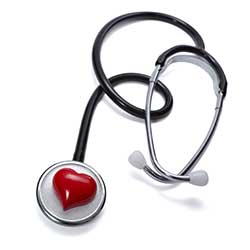Heart Health

Take care of your heart. Getting daily physical activity, eating healthier foods, and not using commercial tobacco products are ways to keep you and your family's hearts healthy.
Benefits of having a healthy heart
A healthy heart helps:
- Pump oxygen from your lungs to the rest of your body;
- Make physical activity easier; and
- Reduce your risk of having a heart attack or stroke.
Steps to having a healthy heart
Be More Active
- Be active for at least 30 minutes on most days of the week.
- Any activity or movement is good.
- If you cannot do 30 minutes all at once, try breaking your activity down to 3 sessions a day for 10 minutes at a time.
- Listen to your body. Some days you may feel like you can do more. Other days you may need to take it easy.
- Invite your family or friends to join you.
Make Healthy Food Choices
- Eat a wide variety of fruits and vegetables every day. Choose fresh, frozen, dried, or canned.
- If you need help getting healthful food, ask your health care team about food assistance programs in your community.
- Grill or bake instead of frying your foods.
- Avoid cooking with lard, butter, or shortening.
- If you eat meat, choose lean meat, fish, and wild game. Trim the fat off of meat before cooking.
- Limit the amount of salt you eat.
- Try herbs and spices to season your food so you can use less salt.
- When shopping for food, compare labels. Choose foods with the lowest amount of sodium (salt). Look for "sodium free," "salt free," "low sodium," or "no salt added."
- Be careful when choosing foods that are pickled, brined, barbecued, cured, smoked, or are in any type of sauce. These tend to be high in sodium (salt).
- Eat meals together at home. It is a great way to help your family create good eating traditions.
- Choose water instead of sugary drinks like fruit juices, soda pop, sweet tea, or sports drinks.
Avoid Commercial Tobacco Products
(These include cigarettes, cigars, spit tobacco and e-cigarettes.)
- Be a good role model by not smoking or using any other type of commercial tobacco.
- If you smoke or use spit tobacco, resources are available to help you quit.
- Get free help by calling 1-800-QUIT-NOW (1-800-784-8669) or contact your tribal, urban, or Indian Health Service clinic.
- Smoking around others is harmful. If you must smoke, take it outside, and ask others to do the same.
- Stay away from secondhand smoke and thirdhand smoke . Avoid places that allow smoking and teach your child to do the same.
Know Your Numbers
- High blood pressure makes your heart work harder than it should. This may also damage blood vessels in your heart and kidneys.
- Get your blood pressure checked at every clinic visit.
- Ask what your target numbers should be for blood pressure.
- Have your blood cholesterol checked with a lipid panel.
- Learn about how managing cholesterol can protect your heart.
- Take your medicines as prescribed. If you have questions about your medicines, talk to your health care team.


